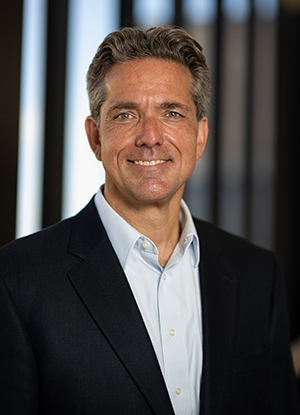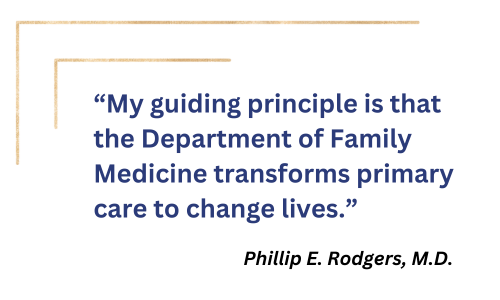Phillip E. Rodgers, M.D., FAAHPM, has been appointed chair of the Department of Family Medicine and the George A. Dean, M.D. Professor and Chair of Family Medicine in the Medical School.

Dr. Rodgers, a member of the family medicine faculty for 27 years, has built a passion for the teaching and practice of full-spectrum family medicine from obstetric and newborn care through palliative and end-of-life care. A graduate of the Medical College of Ohio, Dr. Rodgers completed family medicine residency training in our program at the University of Michigan. He has served in numerous departmental leadership roles, most recently as director of faculty development and as service chief. At the institutional level, he has served on the Executive Committee on Clinical Affairs and the Medical School Executive Committee.
“I have pursued my career in academic family medicine with the enduring belief that individual, family and community health are fully interdependent, and that our greatest imperative as health professionals is to advance all three comprehensively, collaboratively, and creatively. This belief aligns with Michigan Medicine’s vision ‘to advance health to serve Michigan and the world’, and I am certain that our Department of Family Medicine will continue to play an essential role in realizing that vision,” Dr. Rodgers noted.
With a long history of leadership experience in palliative care, Dr. Rodgers brings a wealth of experience to the role. In 2005, working with nursing, social work and hospital leadership, he became founding director of the U-M Palliative Care Program. Starting with small consultation teams for seriously ill hospitalized adults and children, Palliative Care at Michigan Medicine has grown into thriving adult and pediatric palliative care programs that provide interdisciplinary inpatient, outpatient and community-based care, deliver robust interprofessional education to learners at all levels, and foster emerging research portfolios. This growth has been enabled by highly collaborative leadership across the departments of Family Medicine, Internal Medicine and Pediatrics working with Michigan Medicine partners and leaders from the schools of Nursing, Social Work and Pharmacy. Dr. Rodgers became the first faculty member of any U-M department to be named fellow in the American Academy of Hospice and Palliative Medicine, and he has since been recognized with several other national awards.
His passion for palliative medicine has expanded beyond patient care and education and he is now a leading national expert in payment and care delivery innovation in palliative care, and he has provided substantial leadership and expertise to numerous national stakeholders including the American Academy of Hospice and Palliative Medicine, the Palliative Care Quality Collaborative, the National Academies of Science, Engineering and Medicine and the Centers for Medicare and Medicaid Innovation, among others. His work has influenced important policy changes that have improved access to care by patients with serious illness and their caregivers.

Dr. Rodgers is mission-driven and has a strong vision for the future of Family Medicine at Michigan Medicine.
“My guiding principle is that the Department of Family Medicine transforms primary care to change lives. This is the next phase of our development as a leading national department of family medicine within a dynamic and growing academic health system. It is also, most importantly, what our people and our communities need and deserve. And I stay anchored firmly in the belief that our people, our teams, and our communities working together are the foundation of our future,” he stated.
Dr. Rodgers shared his three strategic priorities for the Department under his leadership. The priorities are based on the National Academies of Sciences, Engineering, and Medicine’s 2021 report “Implementing High Quality Primary Care: Rebuilding the Foundation of Health Care,” which he calls a roadmap.
1. Complete transition to a fully population-based Primary Care Payment and Delivery Model and continue innovating team-based primary care delivery.
Our department has been at the forefront of primary care delivery innovation for more than twenty years. As early adopters of the Patient-Centered Medical Home (PCMH), we helped to establish team-based primary care in the state of Michigan and across the US through leading participation in the early demonstration projects led by the Centers for Medicare & Medicaid Services. These projects established shared savings models and showed that the PCMH can improve quality, increase the use of preventive services, and help control costs. Today we are in the fourth year of a five-year plan to transition from a fee-for-service payment model to population-based payments for team-based primary care. Our work in this arena includes partnering with the American Board of Family Medicine, to help implement tools like PHATE, which provides data on social determinants of health in real-time to our care teams and allows us to provide better, more equitable care.
Dr. Rodgers notes, “Very few departments across the US are taking this innovative step and our Department is well-poised to lead this transformation. We will be completing evaluations on this model and disseminating the data and lessons learned from our transformational work.”
2. Focus family medicine education and training at all levels to prepare and support the high-functioning primary care teams of the future.
“Addressing our current and rising primary care workforce crisis means devoting constant attention to innovation in our education and training programs. We have a rich tradition of education excellence at all levels and our Department is fortunate to have a deep bench of educational leaders. Our collective task is to lean into educational models that prepare and support our family medicine teams for high-quality practice today and tomorrow in response to modern learners’ needs,” he shared.
His plan, based on his experience in Michigan Medicine’s palliative care program, will seek to develop a fully interprofessional educational platform, along with re-imagining the family medicine clerkship experience for medical students, and expanding innovation in competency-based residency education.
3. Continue evolution from an investigator-focused to a core-focused research program, including expansion key areas and invest in future primary care physician-scientists.
“Creating communities of scholarship has many benefits including enabling collaboration, being an engine for recruitment, as well as innovation and sustained research success,” he notes.
In addition, his plan includes exploring additional avenues of research including rigorously evaluating our team-based care model and primary care management of obesity and Type 2 diabetes, noting that refining, scaling and disseminating this work has the potential to transform practice and change lives everywhere. He has emphasized the importance of investing in the next generation of primary care physician-scientists and is enthused about developing a formal research track within our family medicine residency program to create a visible mechanism to attract, support, and mentor future clinician investigators.
Two factors have shaped his development of these strategies. The first is his belief in the people of family medicine. “Our people are our superpower and our most precious resource, and I could not imagine a better community to support, to facilitate, and to collaborate with to achieve our shared vision and shared goals,” he said.
The second is a determination to center all work on health equity, noting that he does not consider health equity to be a strategic priority but rather a guiding principle for all our efforts. “Strategic priorities can shift and change. Health equity must remain at the foundation of our work and serve as an enduring guiding principle for us as we move forward into an exciting and uncertain future,” he said “Diversity, equity, inclusion, accessibility, and justice are core values in Family Medicine, will be incorporated in all Department planning, functions, policies and activities. While these issues are now increasingly visible and increasingly under discussion in our society, they have been ever--present. Our attention to addressing them in each part of our work is critically important and must be with us every day and in every way.”
Dr. Rodgers assumed the role of the George A. Dean, M.D. Chair of Family Medicine on September 1. Philip Zazove, M.D., the previous chair retired in 2022 after eleven years of steadfast and inspiring leadership. Margaret A. Dobson, M.D., assistant chair, has led the Department as interim chair in the meantime. Dr. Rodgers joined the entire Department and our collaborators across Michigan Medicine in thanking her for her exceptional service, leadership, and mentorship.
“I would like to thank Dr. Dobson for her service as our interim chair. I could not imagine a more engaged, a more committed, or more skilled leader and interim chair than Dr. Dobson. We are incredibly grateful to her.”


